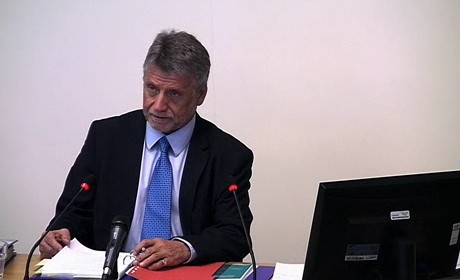
Neil Wallis: hired by Metropolitan police to provide PR advice after leaving News of the World
The Metropolitan police showed "poor judgement" and seemed "oblivious to the perception of conflict" when they hired former News of the World deputy editor Neil Wallis as a PR consultant and found a job in the police force for his daughter, the Independent Police Complaints Commission ruled today.
The police watchdog said "professional boundaries became blurred" in the relationship between Wallis and senior Metropolitan police officers. It found that the force's head of press Dick Fedorcio, who resigned last month, had a case to answer for misconduct.
The IPCC also criticised former assistant commissioner John Yates' apparent involvement in helping to secure a job for Wallis's daughter. The body said there was no evidence found of corruption, but that in both cases policies were breached.
Wallis left the News of the World in June 2009 and set up a consultancy company shortly before the Guardian published an article claiming that phone hacking was more widespread than previously revealed.
The paper's former deputy editor was hired by Fedorcio to provide communications advice to the Met and was paid £24,000 from October 2009 to September 2010.
Fedorcio told the Leveson inquiry that he had no reason to believe that Wallis was not a suitable person for the job, and that the first he knew about the phone-hacking allegations was on the day Wallis was arrested in July 2011.
The IPCC ruled today that Fedorcio failed to ensure that Wallis was properly vetted and employed him prior to a written contract being finalised.
IPCC deputy chair Deborah Glass said in a release today: "Despite the growing phone-hacking scandal, which must have exercised the MPS at a senior level and which was beginning to damage the reputation of the Metropolitan Police in late 2009, senior people appear to have been oblivious to the perception of conflict.
"It is clear to me that professional boundaries became blurred, imprudent decisions taken and poor judgement shown by senior police personnel.
"I am acutely aware that both reports are being published against the backdrop of the Leveson inquiry, which is examining the relationship between the police and the media.
"The ongoing inquiry is painting an uncomfortable picture of the relationship between the biggest police force in Britain and sections of the media. This culture has had an impact on public confidence, although I also observe that since these cases were referred, none of the senior personnel referred to in these reports are still serving."
On Fedorcio's resignation last month, Glass said: "The IPCC cannot prevent a member of police staff leaving before facing misconduct proceedings. But I can and do observe that such a practice can be hugely damaging to public confidence."
In the case of Wallis's daughter getting a job at the Metropolitan police, the IPCC said "employment policies were not followed".
The watchdog said Yates's decision to forward her CV to the director of human resources did not amount to misconduct, but that he showed "poor judgement" in doing so, and that his actions had the "foreseeable consequence that human resources staff believed that they were obliged to find a post".
Free daily newsletter
If you like our news and feature articles, you can sign up to receive our free daily (Mon-Fri) email newsletter (mobile friendly).









